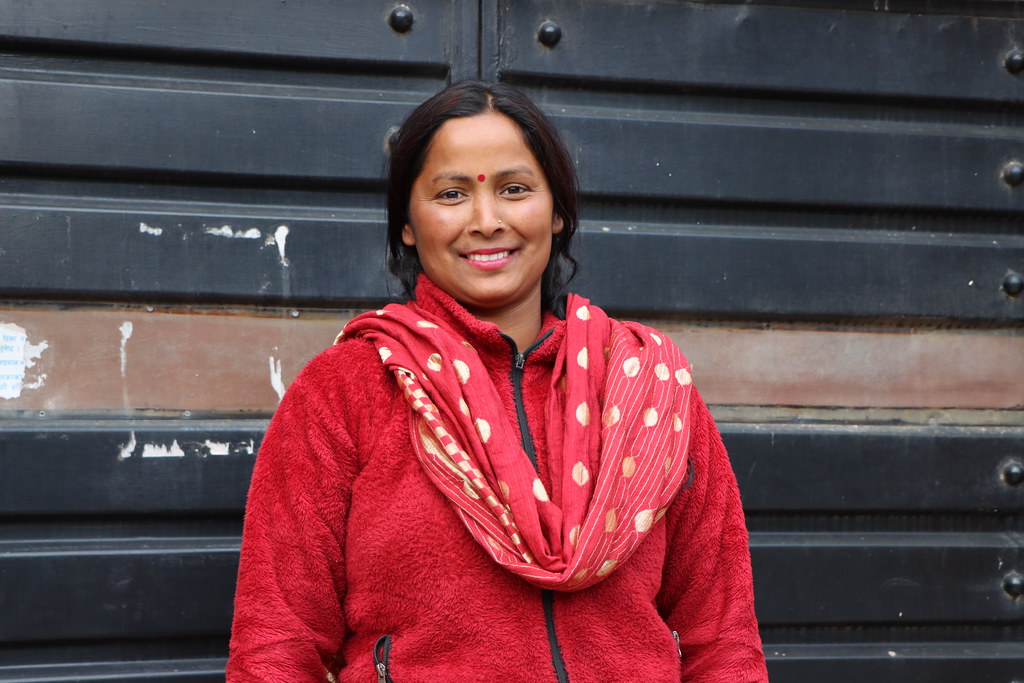In the words of Rabina Pariyar: “It's about transforming oneself first, and other communities will follow.”
Date:

Rabina Pariyar is a member of the “Ugrachandi Nala Mahila Samuha” a women’s self-help group in Ugrachandi, east of Kathmandu. Since 2022 she has participated in the Storytelling Initiative, also known as Hamro Sahakarya (Our Collaborative Action), a project working on enhancing women’s leadership, movement building and advocacy for social norm change on gender equality across communities in Nepal. Pariyar spoke to UN Women about her past experiences, some positive changes she has seen, and some of the prejudice and discrimination that persists around gender and caste in her country.
I was born in Bhaktapur District [on the eastern outskirts of Kathmandu]. My mother passed away when I was in grade 6 and there were many responsibilities in the family. I began learning to sew to support my family, and I was discouraged from continuing my studies. When I got married, I moved here to ward no. 4 of Banepa Municipality, and have been living here since then.
In 2022, representatives from the Municipality reached out to invite local residents to introduce the formation of self-help groups. We were then invited to join the discussion of the "Hamro Sahakarya" project, aimed at understanding and changing harmful social norms, regarding gender equality.
For example, earlier, in our community we have faced challenges primarily around societal attitudes. For example, during menstruation we had to live in a separate room. It was quite strict; I had to stay in isolation for 16 days, not allowed to go out, forbidden to look at the sun. But now, since joining this group, even though we have two daughters, we don't subject them to that practice.
Also in the past, [married] women were confined to staying indoors, focused solely on household duties, caring for their husbands. After having children, their responsibility was solely centred around taking care of the kids. People would gossip about the women who go outside for work. But after joining this group, I realized that daughters are just like sons, and we have the right to work outside, not limited to household chores.
It used to be ingrained in our tradition that if you go beyond the norms, it would be considered that you have committed a sin, and you must face punishment.
However, through our association with the Center of Dalit Women Nepal, we came to realize that not following such practices would make no difference. We read stories and gained valuable lessons and have broadened our understanding. Now, I refuse to go along with such practices.
We had this activity in our group called Jivan ko Nadi or “River of Life.” Life is like a river—it's not constant. From birth, through childhood, understanding ourselves, facing challenges, experiencing joyous moments, and dealing with obstacles, life is a dynamic flow. Just like a river, there are ups and downs. When there are obstacles, I've learned not to dwell on negative thoughts but to find solutions. There are places that you can go and people that you can rely on.
I've learned a lot, but the key is that one must rely on oneself. It's about building self-confidence, and with that confidence comes inner strength and the ability to stand on your own, having a voice and a platform to express your thoughts is also important.
It is of foremost importance to me that there should be a shift in mindset; people's thinking needs to evolve through education. It's about initiating a gradual change by transforming oneself first, and subsequently, other communities will follow suit.
To my daughters and other women, I want to say that there's no need to feel inferior. I have two daughters, and I know that you don't need to be a son to bring joy to your mother. Also, as a daughter, you shouldn't accept misfortune. Study a lot, excel, and you can achieve great heights.
People may judge you, discourage you from walking or studying too much, and push you to get married. They say you should marry and leave your house soon, and if you age, you won't find a suitable match. Don't heed such advice; stand on your own feet. Marriage should be considered after the age of 25 or 26. Don't rush into it; read, walk well!
Hamro Sahakarya: Our Collective Action (the Storytelling Initiative) is a project implemented by UN Women Nepal with financial support from the Government of Finland that aims to promote social norm change on gender issues. Featuring three main components: research, community-based programming interventions and advocacy, the project uses storytelling as a tool to challenge dominant narratives.
